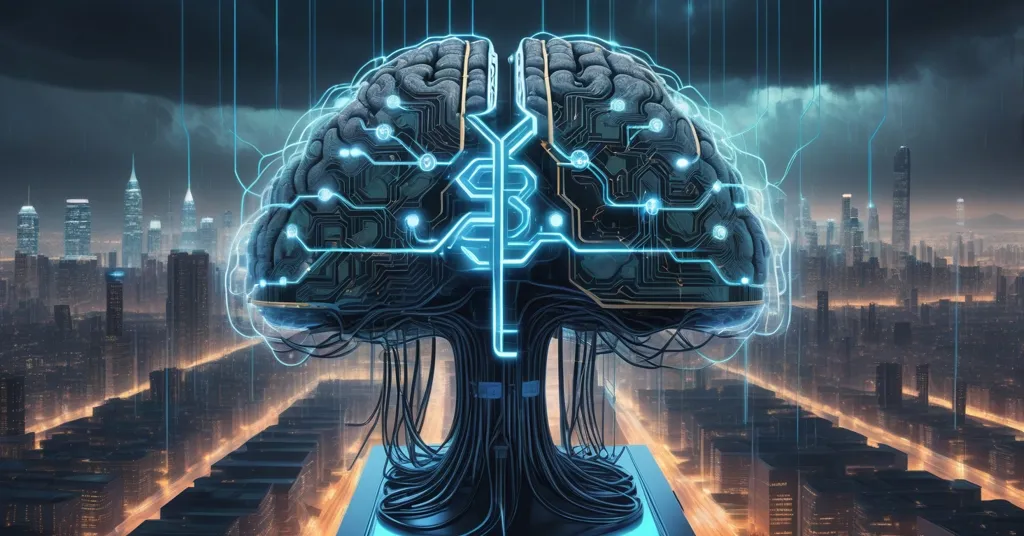OpenAI’s $500B Valuation: AI Giant’s Hype and Blockchain Potential Explored

OpenAI’s $500B Valuation Hype: A Game-Changer for AI and Blockchain?
OpenAI, the powerhouse behind ChatGPT, is on the cusp of a staggering valuation jump to $500 billion as current and former employees prepare to offload $6 billion in shares to investors like SoftBank, Thrive Capital, and Dragoneer Investment Group. While this could crown OpenAI the world’s most valuable startup, surpassing SpaceX, it’s a story layered with talent wars, product stumbles, and untapped potential for blockchain synergy.
- Valuation Leap: OpenAI’s worth could soar from $300B to $500B with a $6B employee share sale.
- Investor Muscle: SoftBank leads a $40B fundraising round amid talks to buy shares.
- AI Challenges: Talent poaching and GPT-5 flops test OpenAI’s momentum.
The Valuation Boom: Half a Trillion on the Line
The buzz around OpenAI hitting a $500 billion valuation isn’t just another tech headline—it’s a seismic shift. This secondary share sale, where employees sell their stakes to outside investors (not the company issuing new shares), involves a hefty $6 billion and could redefine the startup pecking order. If it pulls through, OpenAI would leapfrog SpaceX, currently valued at $400 billion, and claim the top spot globally. For context, that’s a bigger market cap than many legacy corporations, fueled by investor faith in AI as the next industrial revolution. But let’s not pop the champagne yet—eye-popping figures often come with equally massive risks.
Driving this deal are big names like SoftBank Group, Thrive Capital, and Dragoneer Investment Group. SoftBank, in particular, is playing hardball, leading a $40 billion fundraising round with $8.3 billion already secured as of early August 2025. This isn’t their first rodeo—they previously snapped up $1 billion in OpenAI employee shares, showing a relentless appetite for AI dominance. Beyond cash, SoftBank’s 50-50 joint venture with OpenAI, named Cristal Intelligence, aims to build enterprise AI tools, splitting costs and profits evenly. It’s a bold bet, but one that reeks of the speculative fervor we’ve seen in crypto markets. If it misfires, the fallout could be ugly.
Financially, OpenAI is projecting a monstrous $13 billion in revenue for 2025, at least triple its 2024 earnings based on reported estimates. That kind of growth explains why investors are throwing money at them. But for us in the crypto space, it’s a reminder of Bitcoin’s own meteoric rises—and the inevitable crashes that follow unchecked hype. Is OpenAI built to last, or are we witnessing the prelude to a tech bubble?
Talent Wars and Liquidity: The Human Cost of AI
Why are employees cashing out now? It’s about liquidity—turning shares into hard cash without losing value, much like selling a hot NFT at peak market price. The AI talent market is a brutal arena, with tech giants like Meta waving obscene paychecks to poach top minds. High-profile exits, such as ChatGPT co-creator Shengjia Zhao jumping ship, signal a brain drain that could cripple innovation. OpenAI’s move to restrict this share sale to staff with at least two years of tenure is a calculated play—reward loyalty and retain talent amidst chaos. But let’s be blunt: no amount of cash can replace a visionary coder if they walk out the door.
This mirrors challenges we’ve seen in crypto. Remember when blockchain startups bled developers to TradFi firms during the 2017 ICO boom? Human capital is the backbone of any tech revolution, whether it’s AI or decentralization. OpenAI’s strategy might buy time, but the war for talent is far from over.
GPT-5 Flop: When Innovation Stumbles
Not everything is rosy in OpenAI’s garden. The August 2025 rollout of GPT-5, their latest AI model, bombed spectacularly. Users tore into it for being sluggish, botching image analysis, delivering bland responses, and just feeling dumber than its predecessor, GPT-4. Some paying customers were forced to use the new model, only for OpenAI to backpedal and revert to older versions like GPT-4o for certain features. Sam Altman admitted they underestimated user attachment to the prior tech, a rare mea culpa from a tech titan.
Let’s call it what it is—GPT-5 flopped hard, and OpenAI scrambled to fix the mess. This isn’t just a hiccup; it’s a warning. Rushing unpolished products to market risks alienating users, a lesson crypto projects know all too well. Think of clunky wallets or buggy dApps that drove away mainstream adopters. Innovation at breakneck speed sounds sexy, but if it sacrifices usability, as seen in GPT-5 user feedback, you’re dead in the water.
AI Meets Blockchain: The Next Frontier?
For us decentralization diehards, OpenAI’s saga isn’t just an AI story—it’s a blueprint for what could turbocharge crypto. Imagine AI-driven smart contracts on Ethereum, crunching real-time data to optimize decentralized finance (DeFi) protocols. Or picture an AI-powered Bitcoin wallet sniffing out scams before you hit “send.” Projects like Ocean Protocol, which blends blockchain with AI for secure data sharing, or Fetch.ai, building autonomous AI agents on decentralized networks, show the synergy isn’t sci-fi—it’s happening with ongoing research into AI and blockchain integration.
But there’s a catch. Both AI and blockchain face user adoption hurdles. Just as GPT-5’s clunky interface frustrated users, many crypto tools still feel like rocket science to the average Joe. If OpenAI can crack intuitive design, it might pave the way for blockchain interfaces that don’t require a PhD to navigate. And let’s not forget security—AI could bolster Bitcoin transaction monitoring against fraud, making our networks ironclad. The potential is massive, but execution is everything.
Energy Crisis: AI’s Bitcoin-Sized Problem
Zooming out, the AI boom carries a dirty secret—energy consumption. Training models like GPT-5 can emit as much carbon as five cars over their lifetimes, according to MIT studies. Massive initiatives like the $500 billion Stargate project for AI data centers only amplify the issue, guzzling power akin to Bitcoin mining farms. During talks at SoftBank World, Sam Altman and Masayoshi Son hyped AI’s global demand but sidestepped this elephant in the room. Sound familiar? It’s the same flak Bitcoin takes for its environmental footprint.
Here’s the kicker: if AI costs drop tenfold as Altman predicts, adoption could spike thirtyfold or more. But without sustainable energy solutions, we’re courting disaster. Crypto has started exploring green mining with renewables—could AI learn from us? Or will both sectors face regulatory hammers over power usage? It’s a blind spot that could derail even the most visionary plans.
“As we drive the cost of AI down, more people want to use it… if we make the cost of AI 10 times cheaper, people wanna use it 30 times as much or whatever. And the demand for intelligence in the world just seems to be huge.” – Sam Altman
SoftBank’s Gamble: Genius or Crypto-Style Bust?
SoftBank’s aggressive push, led by Masayoshi Son, raises eyebrows. Their vision of a billion AI agents in 2025, complete with self-improving robotics, feels like something out of a cyberpunk novel. They’re even dangling up to $30 billion more for OpenAI, pending operational tweaks. But despite a 38% stock rally in June 2025, SoftBank trades at a discount due to complex financing risks. Ring any bells? It’s not unlike over-leveraged crypto whales dumping billions into shaky altcoins—huge upside, but a brutal crash looms if the bet sours, as explored in discussions on SoftBank’s investment impact.
For the crypto crowd, this is a cautionary tale. Hype can inflate valuations to the moon, but fundamentals matter. If SoftBank’s AI gamble falters, the ripple effects could chill investor sentiment across tech, including blockchain. It’s a stark reminder that fortunes aren’t built on blind faith alone, especially when considering SoftBank’s broader AI and blockchain strategies.
Regulatory Shadows: The Unspoken Threat
Then there’s the looming specter of regulation. Governments worldwide are waking up to AI’s data privacy implications and energy demands, much like they’ve targeted Bitcoin mining or DeFi anonymity. If AI scales without guardrails, expect crackdowns that could mirror crypto’s own battles with lawmakers. Will OpenAI’s growth provoke the same knee-jerk policies that have stifled decentralized projects? And could blockchain offer solutions, like transparent AI data logs on immutable ledgers? These are questions neither Altman nor Son have tackled publicly, but they’re coming, as debated in online forums about OpenAI’s valuation.
Key Takeaways and Questions
- What’s fueling OpenAI’s potential $500 billion valuation?
A $6 billion employee share sale to investors like SoftBank, paired with a $40 billion fundraising round and projected 2025 revenue of $13 billion, drives this massive leap. - Why are employees offloading shares now?
It provides liquidity—quick cash—in a cutthroat AI talent market where giants like Meta poach key players with big offers, testing OpenAI’s retention. - How could AI intersect with blockchain and Bitcoin?
AI might enhance Ethereum smart contracts for DeFi or secure Bitcoin transactions against fraud, though both face adoption barriers with complex user interfaces. - What pitfalls does OpenAI face despite the hype?
GPT-5’s poor rollout, talent drain, and unaddressed energy demands for projects like Stargate risk stalling momentum, echoing crypto’s own growing pains. - Should we worry about SoftBank’s heavy stake?
Absolutely—their financial risks mirror crypto market over-leveraging, where a misstep could trigger broader tech investment chills, impacting blockchain too.
OpenAI’s trajectory is a masterclass in tech disruption, echoing the wild swings of Bitcoin and altcoin markets. Hitting a half-trillion-dollar valuation screams transformative power, but cracks like talent wars, product missteps, and sustainability woes show no revolution is bulletproof. For the crypto faithful, it’s both a learning curve and a collaboration opportunity—AI could propel decentralization to new heights if we dodge the same traps. Whether it’s code for a chatbot or a blockchain, the future of money and tech hinges on surviving as the smartest player in the room. Could AI be Bitcoin’s missing puzzle piece, or just another bubble waiting to burst? If you’re curious about OpenAI’s journey, check out its historical context for a deeper dive.



